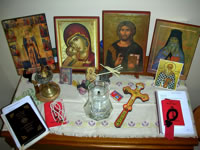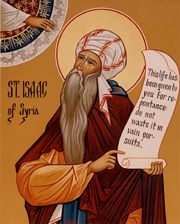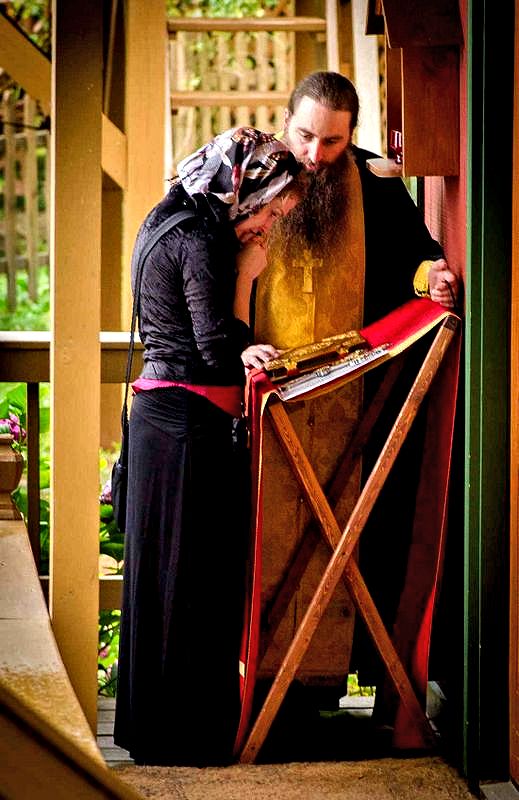Daily prayer is essential to a healthy Orthodox Christian life. It is not an option. Why do we pray, How do we pray, When do we pray and Where do we pray are questions we address below.
 Why do we Pray?
Why do we Pray?• Christ asks us to pray. He tells us in the Gospel of Luke, How much more will
the heavenly Father give the Holy Spirit to those who ask him (Luke 11:13).
We pray so that God can help us to become more like Him in our actions.
• For renewal and the growth of our soul.
• To give thanks to God for all he provides for us.
• To seek forgiveness for our sinfulness as humility is a prerequisite for prayer.
We can also pray to seek help for others as well as ourselves. But we must not forget to pray for His help in our own spiritual growth. This is not selfish, but essential for us to better love and serve others and carry out God’s commandments. We can ask also for His help in supporting us in the various ascetic practices we choose to undertake.
 Make your life a continuous prayer
Make your life a continuous prayerWe are asked to pray without ceasing. Here are the Scripture references to this idea.
Pray without ceasing (1Thess 5:17)
Praying always with all prayer and supplication in the Spirit (Eph 6:158)
He spoke a parable to them, that men always ought to pray and not lose heart.
(Luke 18:1)
God intends our life to become one of a constant prayer where we are continually in a relationship with Him. This is our main task, to draw nearer to God. How do we do this? Saint Isaac of Syria reminds us that it is impossible to draw near to God by any means other than unceasing prayer.
 When Do We Pray?
When Do We Pray?A Regular Time for Prayer
First, you need to establish a regular time to pray. You should have as a minimum a specific time in the morning and in the evening set aside for prayer. With our busy lives this means you will have to make some conscious changes to make time for prayer. Pick a time that you know you can keep no matter what. Strict discipline in this is important. The length of time is something that only you can determine in consultation with your spiritual father. You prayer time should not be less than ten minutes in the morning and then again in the evening. Your time in prayer will grow as your relationship with God grows. At first you will find it a struggle to maintain what seem like a simple discipline as there are negative forces that will try and keep you from regular prayer. But, there will come a time when you can’t wait for the time to pray. Expect a struggle in the beginning to maintain a strict schedule. As the popular saying goes, “Just do it!” Think of all the other things in your life that you do routinely like getting to work of school on time, or personal hygiene acts like brushing your teeth. Surely you can also make prayer a fixed routine..
 Where Do We Pray?
Where Do We Pray?A Quiet Private Place For Prayer

Next, you need to find a quiet private place where you will not be disturbed for your daily prayer. This may be a corner in the bedroom (a room divider can help make a special place), space in a walk-in closet, or, if you are fortunate to have an extra room, a special room that is only for prayer. It needs to be a place where you can be undisturbed and alone. Once you choose the place, you should set up a small home icon stand. On it place an icon of Christ, Theotokos, and your patron saint. Have an oil lamp or candle that you can light while you pray. Also an incense burner, a cross and a prayer book and Bible...
 How Do We Pray?
How Do We Pray?
"Prayer needs no teacher. It requires diligence, effort and personal ardor, and then God will be its teacher." St. Meletius the Confessor

St Isaac the Syrian says we should:
• Pray with attention – so that we can have a true
encounter with God
• Pray with humility – because this sort of prayer goes straight to God’s ear
• Pray with affection and tears – with joy and
thanksgiving, but also with true repentance and purity.
• Pray with patience and ardor – ‘to deny oneself’ is courageously to persevere in prayer.
• Pray from the depths of the heart – even if we pray using ‘the words of another’ they should be uttered as if they are our own. St. Isaac says this is especially true of the Psalms.
• Pray with faith and absolute trust in God – because He knows our life.
 Preparing to Pray
Preparing to Pray
With a regular time and a special place, you are ready to begin. You begin praying by focusing your consciousness in your heart and forcibly gathering there all the powers of the soul and body. Take the time at the beginning of your prayer time to quiet your body and to concentrate your energies in your heart. Christ says, “Enter into thy closet and ... shut thy door” (Matt 6:6). Remove all activities that could disrupt your inner descent. Set aside, to the best of your ability, all of your problems of the day and your worries for tomorrow. This is not a time for thinking or worrying. When you are preparing to pray, stand, sit or walk a few minutes and steady your mind to concentrate on God.
Reflect on who it is that you will be addressing. Remember, it is God Himself who you are about to talk with. Try to bring about a feeling of humility and reverent awe. Make some prostrations before you begin....
Note: When we pray we should face East.
 Follow a Prayer Rule and use written prayers in the beginning
Follow a Prayer Rule and use written prayers in the beginning
You should have a specific rule for both morning and evening. Don’t try and wing it. You are developing a discipline that is beyond what you will feel like doing. This is not a relaxation exercise but a path to be in communion with your God. You will need to have a specific set of guidelines that you follow each time with no excuses for shortcutting them. In your rule, incorporate standing, prostrations, kneeling, making the sign of the cross, reading, and at times singing. Use prayer books and written prayers. The Orthodox prayer books are filled with prayers that have been well tested and used for hundreds of years. Prayer does not have to be a creative activity. You must be sincere. Keep your awareness in your heart and concentrate on the words of the prayer. Once you establish a rule, always keep it. Be sure to work with your spiritual Father on this....
 Focus on each word - Don't rush your prayer
Focus on each word - Don't rush your prayer
As you begin to pray enter into every word of the prayer. Bring the meaning of the words down into your heart. Do not rush through the prayers like you are in a hurry to get them over with. Let them slowly drop into the depths of your heart with humility and awe of God. Its like in driving a car. When you are going 90 miles per hour down the highway you may feel powerful and in control. But at high speeds things can go wrong fast. When driving at a speed of twenty-five miles per hour the car handles easy and if someone makes a dangerous maneuver you can easily avoid it. Well, the mind works the same way. We want to train it to slow down so we can become aware of God’s presence within us. So, in prayer we say the words slowly so we can gain the meaning of them and allow them to penetrate our consciousness and to bring to our heart feelings of love and reverence for our God. Let the words drop individually into your heart like pebbles dropping into a pond. You will eventually find the right pace for yourself. Beware of the tendency to rush to complete them hurriedly. When this tendency is present you have turned your prayer into an obligation and it is no longer true prayer. Don’t worry if you catch yourself doing this. It is normal at first. Just stop and slow down and proceed asking God’s forgiveness and help. Also, study the prayers before you use them so you know the meaning of each word. Eventually you will want to memorize them...
 Concentrate
Concentrate
 How Do We Pray?
How Do We Pray?"Prayer needs no teacher. It requires diligence, effort and personal ardor, and then God will be its teacher." St. Meletius the Confessor

St Isaac the Syrian says we should:
• Pray with attention – so that we can have a true
encounter with God
• Pray with humility – because this sort of prayer goes straight to God’s ear
• Pray with affection and tears – with joy and
thanksgiving, but also with true repentance and purity.
• Pray with patience and ardor – ‘to deny oneself’ is courageously to persevere in prayer.
• Pray from the depths of the heart – even if we pray using ‘the words of another’ they should be uttered as if they are our own. St. Isaac says this is especially true of the Psalms.
• Pray with faith and absolute trust in God – because He knows our life.
 Preparing to Pray
Preparing to PrayWith a regular time and a special place, you are ready to begin. You begin praying by focusing your consciousness in your heart and forcibly gathering there all the powers of the soul and body. Take the time at the beginning of your prayer time to quiet your body and to concentrate your energies in your heart. Christ says, “Enter into thy closet and ... shut thy door” (Matt 6:6). Remove all activities that could disrupt your inner descent. Set aside, to the best of your ability, all of your problems of the day and your worries for tomorrow. This is not a time for thinking or worrying. When you are preparing to pray, stand, sit or walk a few minutes and steady your mind to concentrate on God.
Reflect on who it is that you will be addressing. Remember, it is God Himself who you are about to talk with. Try to bring about a feeling of humility and reverent awe. Make some prostrations before you begin....
Note: When we pray we should face East.
 Follow a Prayer Rule and use written prayers in the beginning
Follow a Prayer Rule and use written prayers in the beginningYou should have a specific rule for both morning and evening. Don’t try and wing it. You are developing a discipline that is beyond what you will feel like doing. This is not a relaxation exercise but a path to be in communion with your God. You will need to have a specific set of guidelines that you follow each time with no excuses for shortcutting them. In your rule, incorporate standing, prostrations, kneeling, making the sign of the cross, reading, and at times singing. Use prayer books and written prayers. The Orthodox prayer books are filled with prayers that have been well tested and used for hundreds of years. Prayer does not have to be a creative activity. You must be sincere. Keep your awareness in your heart and concentrate on the words of the prayer. Once you establish a rule, always keep it. Be sure to work with your spiritual Father on this....
 Focus on each word - Don't rush your prayer
Focus on each word - Don't rush your prayerAs you begin to pray enter into every word of the prayer. Bring the meaning of the words down into your heart. Do not rush through the prayers like you are in a hurry to get them over with. Let them slowly drop into the depths of your heart with humility and awe of God. Its like in driving a car. When you are going 90 miles per hour down the highway you may feel powerful and in control. But at high speeds things can go wrong fast. When driving at a speed of twenty-five miles per hour the car handles easy and if someone makes a dangerous maneuver you can easily avoid it. Well, the mind works the same way. We want to train it to slow down so we can become aware of God’s presence within us. So, in prayer we say the words slowly so we can gain the meaning of them and allow them to penetrate our consciousness and to bring to our heart feelings of love and reverence for our God. Let the words drop individually into your heart like pebbles dropping into a pond. You will eventually find the right pace for yourself. Beware of the tendency to rush to complete them hurriedly. When this tendency is present you have turned your prayer into an obligation and it is no longer true prayer. Don’t worry if you catch yourself doing this. It is normal at first. Just stop and slow down and proceed asking God’s forgiveness and help. Also, study the prayers before you use them so you know the meaning of each word. Eventually you will want to memorize them...
 Concentrate
Concentrate
After you begin to recite your prayers you will find that your mind will want to wander. While you are reciting the words of the pray your mind can jump to something entirely different. Don’t be concerned about this as this is natural due to the forces that do not want us to pray to God. Work to learn to concentrate your attention. Recognize that when this happens you are no longer praying. When you mind does wander, be gentle with yourself and go back and recite again what you said while your mind was elsewhere. Make a concerted effort to bring yourself to concentrate on the words of the prayer. Sometimes it helps to say them out loud for a while. The mind is quite adept at doing more than one thing at a time. You need to bring yourself to a single focus on God. When you are talking to your best friend you don't think of other things when talking with them. When you go into the boss for a discussion you concentrate. God deserves better attention than anyone, so you must learn to concentrate, to focus on the words of the prayer. These wanderings of the mind show you the impact of your busy life that you need to find ways to make quieter so you can be always mindful of God no matter what you are doing. Prayer is not time to be distracted by these worldly activities, because this will only further distract you from prayer. Work to concentrate your attention more and more. Each day you will gain in your attentiveness during prayer. Learn how to lift you mind to be attentive to heavenly things...
 Don't rush into other activities when finished with Prayer
Don't rush into other activities when finished with Prayer
When you finish your prayers, stand for a few moments. Consider to what your prayer life commits you. Try to hold in your heart what has been given to you. Treasure it for a few moments.
 Pray EVERY Morning and Evening at a minimum
Pray EVERY Morning and Evening at a minimum
Remember to make your prayer life one that is a firm rule and not something that is done occasionally or sporadically. It must be done each day morning and evening at a minimum. You need to have specific prayers that are part of your prayer rule. You need to commit to doing you rule each and every day. Think about certain personal hygiene tasks such as brushing your teeth that you do each day out of habit. You don’t forget to do them each day. Your prayer rule needs o become a habit as strong as these. Prayer must become a daily habit that you never forget. Prayer is essential for the health of our soul Just like the hygiene activities that we do for the health of our body.
 Don't rush into other activities when finished with Prayer
Don't rush into other activities when finished with PrayerWhen you finish your prayers, stand for a few moments. Consider to what your prayer life commits you. Try to hold in your heart what has been given to you. Treasure it for a few moments.
 Pray EVERY Morning and Evening at a minimum
Pray EVERY Morning and Evening at a minimumRemember to make your prayer life one that is a firm rule and not something that is done occasionally or sporadically. It must be done each day morning and evening at a minimum. You need to have specific prayers that are part of your prayer rule. You need to commit to doing you rule each and every day. Think about certain personal hygiene tasks such as brushing your teeth that you do each day out of habit. You don’t forget to do them each day. Your prayer rule needs o become a habit as strong as these. Prayer must become a daily habit that you never forget. Prayer is essential for the health of our soul Just like the hygiene activities that we do for the health of our body.













